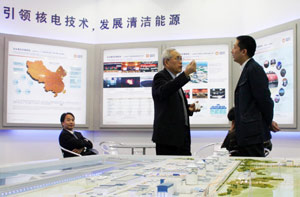Non-State companies venture abroad
Updated: 2011-10-31 09:40
By Li Wenfang (China Daily)
|
|||||||||||
ZHUHAI, Guangdong - A rising number of Chinese non-State companies are preparing to invest abroad, relying on a combination of innovation and manufacturing strength.
Some top non-State companies exchanged views on their "go global" strategies in Zhuhai, Guangdong province, over the weekend.
"Chinese companies should not only serve the domestic market but should go to the world," said Dong Mingzhu, president of electronic appliance giant Gree Electric Appliances Inc.
Gree previously exported air conditioners to the United States mainly through original equipment manufacturing arrangements, but now it has a branch in that country to promote its own-brand products.
"We should not go to a foreign country merely to make money but also to win the respect of the local community by making contributions to the local economy."
Given their flexibility relative to other types of companies, non-State companies have the largest opportunity to benefit from globalization, said Xu Jingnan, chairman of Peak Sport Products Co.
"China has become the world's second-largest economy. Going global is a natural choice."
Peak has been able to utilize global resources at a low cost in promoting its brand overseas by sponsoring sports events.
Feng Jun, president of Aigo Digital Technology Co, one of China's biggest digital equipment makers, forecast substantial growth in non-State companies' moves to go global next year.
Those companies should create a win-win situation, in which they create jobs and pay taxes in foreign countries and at the same time, enable their brand building to become healthier and more sustainable.
More than 420 Chinese firms have invested in Britain and the number is "growing fast", said Alastair Morgan, consul-general of the British Consulate-General in Guangzhou.
Though few Chinese brands are household names in the international market at present, the "next decade would see at least a dozen such names", said Michael Payne, former head of the marketing division of the International Olympic Committee and current chairman of Payne Sports Media Strategies.
Once they feel comfortable with the idea, it is a natural step for Chinese companies to move onto the world stage, Payne said, adding that innovation has joined manufacturing strength on their agenda.
Foreign direct investment (FDI) by Chinese companies rose 21.7 percent year-on-year to $68.81 billion last year, ranking fifth in the world, according to the Ministry of Commerce.
More than 13,000 Chinese enterprises had invested in 178 countries and regions as of the end of last year.
In terms of cumulative FDI by Chinese companies as of the end of last year, State-owned enterprises accounted for 66.2 percent, limited liability firms for 23.6 percent, shareholding companies for 6.1 percent and privately owned companies for 1.5 percent.
Feng urged non-State companies to unite in going global, and he has initiated a group for those companies that will provide improved credibility and favorable treatment as a group in foreign countries.
Companies have also taken individual approaches in their "go global" moves.
Instead of mergers and acquisitions, Gree has focused on organic expansion to avoid the risk in the integration of corporate cultures, Dong said.
Xu warned against going abroad in haste and stressed the need to build up capital strength before such a move.
Running branches in the United States, Middle East, Europe and Southeast Asia, Peak plans to open specialty stores in the US later this year.
Meanwhile, with support from the Chinese and Belgian governments, Bernaerts, a Belgian property developer, plans to open a Chinese brand center at its European Market City (EMC) to promote Chinese brands, said Jennifer Lu, EMC's chief representative in China.
In China's 12th Five-Year Plan (2011-2015), the government will work to speed up the implementation of the "go global" strategy.
Related Stories
ZTE eyes 80% sales from overseas 2011-10-29 11:28
COFCO seeks more overseas acquisitions 2011-10-22 09:04
CNPC plans steady overseas expansion 2011-10-21 10:44
Overseas companies set to boost cruise travel 2011-10-18 14:18
- Small businesses seek less room to maneuver
- It's quality not quantity for Dell
- FAW reports $7.88m net loss in Q3
- China train makers' profits slump
- China's first A380 grounded by mechanical fault
- Top financial officials changed in major reshuffle
- Cruise industry sails into new territory
- Non-State companies venture abroad










